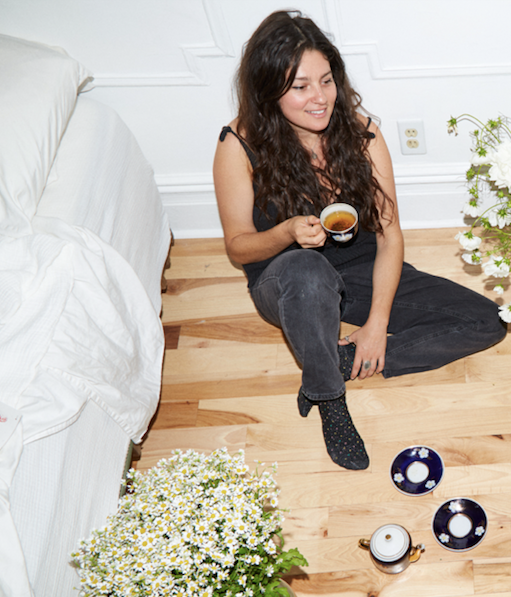At Home: Maria Geyman, Naturopath and Founder of Masha Tea

At Home is about self-care. We're asking some of our favorite people what's keeping them well.
Where is home for you right now?
Greenpoint, Brooklyn!
What are you doing to keep yourself calm?
Taking baths regularly. I like to do floral bath soaks and actually just started packaging these up for Masha to share with everyone early on in quarantine.
What are you watching / reading / listening to?
Watching: The best movie that I've watched during quarantine so far is "The Fabulous Baron Munchausen," an absolutely beautiful and sweet Czech film directed by Karel Zeman.
Reading: I subscribe to a lot of magazines - The New Yorker, Apartamento, Journal du The, Vogue, and I've mostly been keeping up with those.
Listening: Right now, I'm listening to Ravi Shankar "Chants of India" produced by George Harrison.
How did Masha Tea come to be?
My family is Russian and we drink a lot of black tea. Masha is actually the diminutive of my name, Maria, in Russian. I prescribe herbal tea blends to my patients in my naturopathic practice and realized that I could combine my love for art, sustainability, and tea in a cohesive way with this project! I think that it truly started when I approached my favorite designer, Mona Kowalska, of A Détacher to work together and have Masha Tea in her space. This was in fall of 2018. It's slowly been falling into place and growing since then.


Are there certain herbs you are gravitating towards right now? Can you tell us about them?
Holy basil, also called tulsi, or ocimum sanctum in latin, is my go to plant in times of uncertainty. It's a gentle adaptogen and I find that the smell immediately grounds me, the tea balances out my moods, and I don't seem to tire of it. I've been thinking a lot about finding my center during this time and holy basil helps me get there. Like Italian basil, it's in the mint family, grows well in many climates (though it is indigenous to India) and has a dynamic flavor profile for a single herb.
Also, as I mentioned, I grew up drinking a lot of black tea and so Darjeeling tea is a source of stability and comfort for me. I love a cup of strong black tea and lately have been drinking this at night, when I find that I am most creative.
Can you give us a brief breakdown of Skin Tea, Calm Tea, and Genmaicha? We’d love to learn more about what makes each so special.
Yes! Skin Tea winds up being people's favorite because the taste, sweet, earthy, and suggestive of anise, is truly unusual. In my naturopathic practice, skin care is my specialty and I cannot stress the importance of caring for the inside (hormones, digestion, mood) as the best way to ensure healthy skin on the outside. Licorice and burdock root support the liver, thereby supporting those systems. I also love this one as an iced tea.
The Calm Tea is an obvious go-to right now! The herbs in it are all nervines, acting to support and tonify an overactive nervous system. Great for someone who is finding themself anxious in the day by day and having trouble sleeping. Flavor-wise, the lemon balm really comes through, balancing the florals with a bit of citrus. I hoped to create a complete sensory experience with this one. The flowers create a dynamic texture and are lovely to handle.
I was not a green tea drinker until I went to Japan in summer of 2018. Since that trip, I realized that I wanted the Masha green tea program to focus specifically on Japanese teas, though the world of green tea is obviously vast and extends across Asia. Genmaicha is a Japanese green tea with toasted rice. I am kind of obsessed with our new collection of Japanese teas because they are so vibrant and fresh. This one, from Uji, outside of Kyoto, comes with puffed rice, smells amazing, and is accessible even to people who are not typically tea drinkers.



